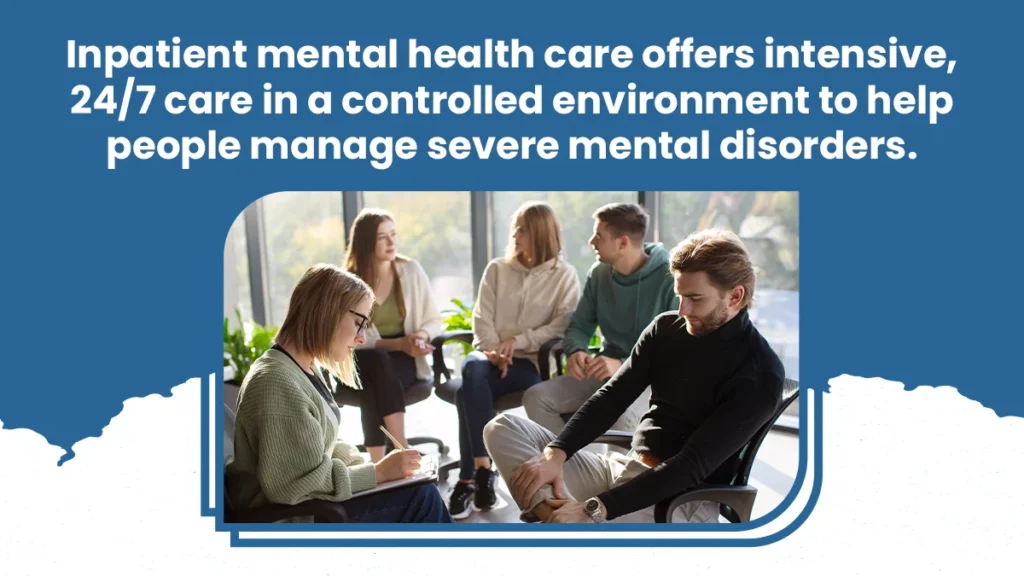Inpatient mental health treatment involves staying at a specialized facility to receive intensive care for mental health conditions. This type of treatment is usually recommended for individuals experiencing severe symptoms that can’t be managed through outpatient care.
During an inpatient stay, patients have access to various services, including therapy, medication management, and support from mental health professionals. This environment allows for constant supervision and a structured schedule, which is vital for recovery.
Key Takeaways
Inpatient mental health care involves staying in a facility for intensive treatment of severe mental health disorders. Here is what this article covers:
- In an inpatient facility, a diverse team of professionals works together to provide comprehensive care.
- Inpatient treatment involves a range of therapies and treatments to address serious mental health conditions.
- During an inpatient stay, patients follow a structured routine aimed at helping them recover smoothly.
For those needing mental health support, The Haven Detox-New England offers comprehensive care. Contact us today at (844) 933-4145 for details!

Understanding Inpatient Mental Health Care
Inpatient mental health care is a form of treatment where individuals stay in a hospital or facility to receive intensive support. The primary goal is to provide a safe environment for those experiencing severe mental health issues that cannot be managed on an outpatient basis.
This level of care is essential for individuals who require constant supervision, medication adjustments, or specialized therapies. Inpatient care helps stabilize symptoms, ensure safety, and begin the path toward recovery with the guidance of mental health professionals.
Inpatient mental health care is provided in various types of facilities, each designed to meet different needs:
- General Hospitals: These hospitals have psychiatric wards where patients receive mental health care alongside other medical treatments.
- Psychiatric Hospitals: Specialized facilities focusing solely on mental health issues, offering intensive treatment and therapy.
- Residential Treatment Centers: Provide long-term care with a focus on both mental health and life skills training.
- Crisis Stabilization Units: Short-term facilities designed to manage acute crises and provide immediate care.
Each type of facility plays a crucial role in addressing specific needs, ensuring that individuals receive appropriate and effective care.
Criteria For Inpatient Admission
Inpatient admission for mental health care is a significant step, often taken when an individual’s mental health needs are severe. Here’s a breakdown of key factors:
Determining Need For Inpatient Care
Inpatient care is considered when someone’s mental health issues are severe and require constant support. This decision is based on whether a person is unable to function safely at home or needs 24/7 medical supervision. Factors like suicidal thoughts, extreme mood swings, or the inability to care for oneself may lead to the need for inpatient care. This type of treatment helps ensure a safe and structured environment for recovery.
Common Mental Health Conditions Treated Inpatient
Several mental health issues are commonly treated in inpatient settings. These include severe depression, bipolar disorder, schizophrenia, and severe anxiety disorders. Inpatient care is used when these conditions are not manageable through outpatient services alone or when immediate, intensive treatment is required. The goal is to stabilize symptoms and provide the patient with the support needed to improve their mental health.
Assessment And Evaluation Process
The assessment and evaluation process for inpatient care starts with a detailed examination by a mental health professional. This includes discussing the patient’s symptoms, medical history, and current issues. Tests and interviews are used to understand the severity of the condition and the need for an inpatient treatment program. This process helps create a personalized treatment plan and ensures the patient receives the right level of care.
The Treatment Team At The Inpatient Facility
Inpatient mental health treatment involves a dedicated team of professionals working together to support patients’ recovery. Here’s a look at the key members of the treatment team:
Psychiatrists And Psychologists
Inpatient treatment involves various mental health experts, including psychiatrists and psychologists. Psychiatrists are medical doctors who can prescribe medications and manage severe mental health conditions. Psychologists focus on providing therapy and conducting psychological assessments. Together, they help create and adjust treatment plans based on the patient’s needs.
Nurses And Nurse Practitioners
Nurses and nurse practitioners play a crucial role in daily patient care. They monitor patients’ health, administer medications, and assist with daily needs. Nurse practitioners can also evaluate patients and make treatment decisions, working closely with psychiatrists to ensure effective care. They provide support and reassurance, making sure patients are comfortable and safe.
Social Workers And Therapists
Social workers assist with practical needs, such as connecting patients to community resources and support services. They help with planning for aftercare and addressing social or emotional challenges. Therapists, including counselors and psychotherapists, offer various forms of talk therapy to help patients cope with their mental health issues and improve their overall well-being.
Support Staff And Technicians
Support staff and technicians also contribute to the smooth operation of the inpatient treatment facility. They handle various tasks such as maintaining the environment, preparing meals, and assisting with daily activities. Technicians may also help with medical equipment and ensure that the facility runs efficiently, creating a safe and supportive atmosphere for patients.
Treatment Approaches In Inpatient Settings
Inpatient mental health treatment involves a variety of approaches to address severe mental health conditions. Here are the main treatment approaches used:
Medication Management
Medication management is a key part of inpatient services. Doctors prescribe medications to help manage symptoms of mental health conditions. These may include antidepressants, antipsychotics, or mood stabilizers. The treatment team monitors how well the medications work and adjusts dosages as needed. This ensures that patients get the most effective treatment for their condition.
Psychotherapy And Counseling
Psychotherapy and counseling are also important in inpatient treatment. Therapists use various methods to help patients understand their thoughts and emotions. Common types of therapy include cognitive behavioral therapy (CBT) and dialectical behavior therapy (DBT). These therapies help patients learn new coping skills, address negative thought patterns, and improve their emotional well-being.
Alternative And Complementary Therapies
Alternative and complementary therapies offer additional support in inpatient settings. These may include activities like art therapy, music therapy, or mindfulness practices. Such therapies can help patients express themselves creatively, reduce stress, and enhance their overall treatment experience. They are used alongside traditional treatments to provide a more holistic approach to mental health care.
Daily Life In An Inpatient Facility
Daily life in an inpatient facility is designed to support individuals in their recovery through structure, routine, and comprehensive care. This is what a typical day usually looks like:
Morning Routine
Inpatient facilities typically start the day early. Patients wake up around 6:00 or 7:00 AM. They often begin with personal hygiene routines like showering and getting dressed. Breakfast is usually served around 7:30 AM, providing a nutritious start to the day. Morning meetings or therapy sessions might follow, focusing on setting goals and discussing the day’s activities.
Therapy And Activities
Throughout the day, patients participate in various therapy sessions. This can include individual therapy with a counselor, group therapy where patients share their experiences, and skills training. Activities might be planned to help patients develop new coping strategies, improve social skills, or engage in hobbies. Structured schedules ensure that patients stay engaged and productive.
Meals And Social Time
Meals are provided at regular intervals, typically breakfast, lunch, and dinner. These meals are designed to be healthy and balanced. Patients usually eat together, which helps build a sense of community. After meals, there’s often time for recreational activities or social interactions, allowing patients to relax and build connections with others.
Evening Routine
In the evening, patients might attend additional therapy sessions or participate in relaxation activities like meditation or yoga. Dinner is usually served around 6:00 PM, followed by some free time. Patients may use this time to read, watch TV, or engage in other low-key activities. The day typically ends with a wind-down period, where patients prepare for bed and reflect on their progress.
Transitioning Out Of Inpatient Care
As patients prepare to leave inpatient care, a smooth transition is crucial for continuing their recovery and well-being. Here’s how the transition process is managed:
Discharge Planning
Discharge planning begins as a patient’s treatment in an inpatient facility nears completion. The team works with the patient to create a plan for leaving the facility and continuing their recovery. This plan includes instructions on how to take medications, follow up on therapy, and manage daily activities. Effective discharge planning ensures a smooth transition and helps patients maintain their progress.
Aftercare And Follow-Up
Aftercare and follow-up are crucial for ongoing recovery after inpatient treatment. Patients are often scheduled for follow-up visits with their therapists or doctors to monitor their progress. They may also continue taking prescribed medications and attending therapy sessions. Regular follow-up helps to address any new or ongoing issues and keeps the patient on track with their treatment goals.
Community Resources And Support System
Community resources and support systems play a key role in recovery after inpatient care. These resources include support groups, counseling services, and community organizations that offer help. Patients are encouraged to connect with these resources to build a strong support network. This network provides additional help and encouragement as they adjust to life outside the facility.
Frequently Asked Questions (FAQs)
What conditions are treated in inpatient mental health treatment?
Inpatient mental health treatment addresses severe conditions that require close supervision and intensive care. These include major depressive disorder, bipolar disorder, schizophrenia, and severe anxiety disorders. Treatment is also provided for eating disorders, post-traumatic stress disorder (PTSD), and severe personality disorders. This setting offers a structured environment with 24/7 medical support, therapy, and medication management to stabilize patients and support their recovery.
How long is the typical stay in an inpatient mental health facility?
The typical stay in an inpatient mental health facility varies based on individual needs. Generally, stays range from 30 to 90 days. Shorter stays of around 30 days might be suitable for those needing initial stabilization or short-term support. Stays of 60 days are common for more intensive treatment, while 90 days or longer may be necessary for those with complex or severe conditions requiring extensive care. The length of stay is tailored to each person’s progress and treatment goals.
What types of therapies and treatments are provided during inpatient care?
Inpatient care offers various therapies and treatments to support recovery:
- Medication Management: Prescribing and monitoring medications.
- Individual Therapy: One-on-one sessions with a therapist.
- Group Therapy: Sessions with peers to discuss and support each other.
- Behavioral Therapy: Techniques to change unhealthy behaviors.
- Family Therapy: Involving family members in the treatment process.
- Skill-Building: Developing coping and life skills.
These therapies help address mental health challenges in a structured environment.
Transform Your Life With The Haven Detox-New England
The Haven Detox-New England is here to support you on your journey to mental wellness. Our team offers a full range of mental health services in a safe, supportive residential rehab setting.
Here, you’ll receive effective therapies, medication management, and peer support tailored to your needs. If mental illness has led to substance abuse, our dual diagnosis program can help. We are ready to guide you through recovery with compassion and expertise.
Don’t wait to take the first step towards a brighter future. Reach to us now at (844) 933-4145 and start your path to healing today. We are here to help you every step of the way.
Verify Insurance
Let’s get you or a loved one help with a few simple steps.




